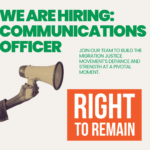
After receiving your refugee status, it can be confusing to know where you can access support, now that you are no longer seeking asylum. For instance, what do you do about how to get housing, social care, benefits, work, and bring family here?
This short blog outlines a number of resources that you can use to get started.
Accessing support
Rainbow Migration has created a useful guide which outlines how you can access mental health support, housing, benefits, education, training and employment following a positive Home Office decision.
You can read this guide here.
You can also contact your local Citizens Advice Bureau for advice after receiving your refugee status. They have created an information sheet detailing how you can get housing, and opening a bank account, working and getting a National Insurance Number.
You can access this information sheet here.
The Migration Justice Project, part of Law Centre Northern Ireland, have created a guide for people who have received Refugee Status, Humanitarian Protection, or Discretionary Leave to Remain. This guide includes information on rights, social security, Biometric Residence Permits and more.
You can read the Refugee Transition Guide here.
The Migration Justice Project’s guide is helpful, but please note that some of the information is Northern Ireland specific and may not be applicable to people living in the rest of the UK.
Family Reunion
If you have received refugee status, you can apply to have your family members join you in the UK. This process is called ‘Family Reunion’.
Free Movement and Refugee Legal Support have drafted a user-friendly, detailed guide to family reunion which you can use to understand this process. Read the guide here.
Becoming a British Citizen
If you are granted refugee status or humanitarian protection, you can apply for Indefinite Leave to Remain (ILR) in the UK after spending 5 years in the UK. ILR is sometimes called ‘settled status’. You can learn more about applying for ILR here.
After having ILR for 12 months, and if you meet the ‘good character’ requirements, you can apply for British citizenship. This is sometimes called ‘naturalisation’. You can learn more about applying for British citizenship here.
















Hi how are you I looking for a legal aid solicitors how can I have.
Thanks a lot
Farhad Faraji
Hello Farhad, thank you for your message. You can read our Toolkit page about Lawyers to find out more about how to find one here: https://righttoremain.org.uk/toolkit/yourlegalcase/. Please be warned that it is very difficult to find a lawyer with availability due to a Legal Aid crisis (there are more people who need an immigration lawyer than there are lawyers available to serve them).
Even though we are not able to provide you with a lawyer or direct advice, we do have a Toolkit which is a step-by-step guide to the asylum and immigration process in the UK, which many people use to help them through their case whether or not they have a lawyer. You can access it here: https://righttoremain.org.uk/toolkit/
Best of luck to you.
Hello I am wondering if I have not received an answer to the interview
Hello Vladimer, thank you for your message. Unfortunately, most people in the asylum system are waiting a very long time for answers/results at every point of the process due to huge Home Office delays and a backlog. You can learn more about this here: https://righttoremain.org.uk/what-is-causing-the-huge-home-office-delay-in-processing-asylum-claims/
Best of luck to you.
If I got the Refugee ILR, do I still need to give any English or life in a UK test for citizenship?
Dear Arno. See the government website here on the process of applying for UK citizenship. You can apply for citizenship if you’ve lived in the UK for 5 years and have had indefinite leave to remain in the UK for 12 months. The requirements are listed below, and include having passed the Life in the UK test. In solidarity, RtR
Hi, I entered uk via visa on October 2021 and I granted refugee statues on august 2023, now this is my question that which one of these dates I should consider as a beginning of my 5 year so after that I can apply for ILR?
Hello Amin, the 5 years start from the date you received refugee status.
Hello,
I received the Humanitarian protection, with 5 years resident permit. Will that mean I may be deported to my home country if it’s safe after the 5 years resident permit!? If after the 5 years will they apply another 5 years before being eligible for citizenship?
Because I don’t know the difference between the refugee status and humanitarian protection ! Can you assist ?
Thank you
Hi there. Have a look at the Toolkit page on receiving a Home Office decision, and humanitarian protection here: https://righttoremain.org.uk/toolkit/decision/#hp
If you receive a grant of Humanitarian Protection, you may apply for settlement (indefinite leave to remain) in the UK if you fulfil the following requirements:
– You have a residence card showing that you have humanitarian protection
– You have had humanitarian protection status in the UK for 5 years
There is no application fee for you to apply for settlement with Humanitarian Protection, and this will also apply to your partner or child. You should apply during the last month of your current permission to be in the UK.